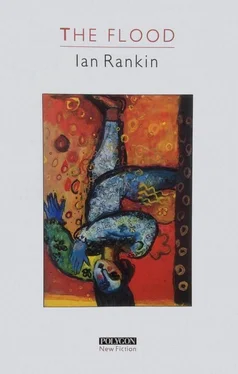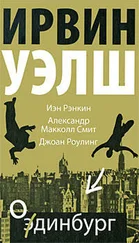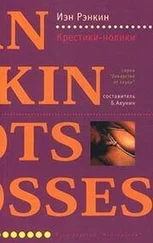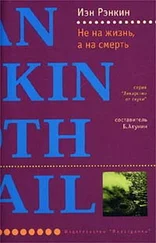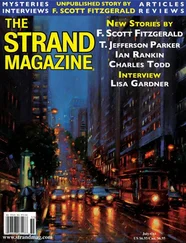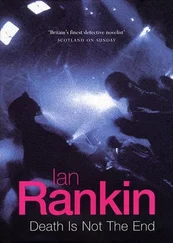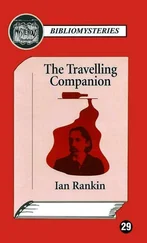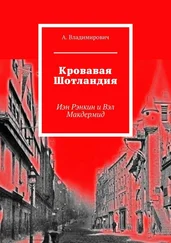‘Yes indeed,’ he said as keenly as he could, ‘probably this weekend in fact. I’ve been rather busy, you see...’ This time the minister patted his shoulder.
‘No need for excuses, George. Only too glad to have you come when you can manage. I look forward to seeing you. Maybe I’ll drop in for some of your pandrops sometime.’
‘Please do,’ said Mr Patterson, walking away. Old bugger, he thought to himself. He’ll want them on the house if he does. Still, the old minister wasn’t a bad sort. Quite wicked in his own way, always berating people for their occupations or preoccupations or sins of indulgence. He was in a right nest of vipers here. Carsden stank of corruption. Mr Patterson remembered it as it had been, or at least had seemed, when he had been young. Times had been hard, yes, but the people had been honest and generous. People, after all, were all that towns had going for them. Mr Patterson had fallen as far as anyone, and further than many. No one knew the sins he had committed. People thought him the salt of the earth. He smiled bitterly as he walked the rest of the way home. If only he could die. He could not commit suicide: he was too much of a coward for that. He wanted needed — to die naturally, but quickly. Let him die quickly.
The very next morning, Mr Patterson learned from his first customer that the old minister had died in his sleep. He shook his head in disbelief. So this was the world. The bitter irony overtook any idea of immediate mourning. It was as if a malevolent creator had decided to show him something of its truly impersonal power. He stood behind the old wooden counter all day and heard nothing but good spoken of the man. He dipped his hand into many glass jars of coloured sweets and guiltily filled many paper bags. No one bought pandrops. Pandrops were for the kirk on a Sunday.
Sandy came in at four o’clock for a haircut. Mr Patterson was silent much of the time, forgetting about the sweets he had promised the boy. He made a good job of his fringe, however. Afterwards, Sandy asked for a quarter of pandrops for his mother. Mr Patterson stared hard at him. It was like staring at his own conscience magnified many times. He should have said something more to the old man. Too late now, too late. He should have said much, much more to the old minister. He gave Sandy the mints and would not take the proffered money.
For over a week he had not seen her. It was like something gnawing inside his stomach. He thought that he might have an ulcer or something, but did nothing about it, afraid that it would be true. He sat in his bedroom much of the time and scribbled on pieces of paper and in old jotters. He read a lot of books from the library. When his mother told him off mildly for sitting indoors when it was so warm outside, he would silently pick up his books and switch off his record player and trot downstairs. He would sit sullenly on the doorstep with a book held close to his face while his mother watched his protest in mounting frustration. He was becoming a zombie to her. She was worried, naturally, but could think of no way to ask him what the trouble was without him clamming up even more than he already had. She again wished that her mother was alive. She wished that she herself had been a stronger mother when Sandy was growing up. She wished a lot of things. Then she would get on with her housework.
Sandy sat on the step. He boiled like an egg in a simmering pan. It was an unpleasant heat. It made him tired and unable to think. He had to squint at his book because of the sun, and that gave him a headache. He could not win. He was reading a quite funny American novel. He guffawed at a few of the jokes. That was as far as a laugh could force itself from his body. He thought about Rian. He fantasised about her, and always in his fantasies she was not the Rian he knew but some wilder, more animal figure. She bit and scratched and connived. Robbie looked over her shoulder into Sandy’s face as Sandy pulled her to the ground and she laughed. These images scared him, and made him uneasy about the true relationship between sister and brother (he remembered the rumours about his own mother and her brother), but at the same time he was gloriously in love with the new version of Rian, a girl who would know things he needed to know and who would teach him the rules of new games. She pulled on his hair as she twisted his face towards hers. He champed like a tethered horse to go to the mansion. His exams had kept him away at first, and then he had been made to visit an ill and very old grandaunt in Leven. He might have gone today, but something held him back — the self-imposed tether. Tomorrow he was going to Kirkcaldy on the expedition planned a few days ago. He had taken some money out of his small bank account for that.
His mother brought him a glass of lemonade, though he had not asked for it. She placed it on the doorstep, while his body tensed.
‘There you are,’ she said. He stared at his book. He thought for a second of ignoring the glass, of not drinking it. She was always doing things like that for him. Then he gave in.
‘Thanks, Mum,’ he said, listening to the ice-cubes tinkling as he lifted the glass. His mother was smiling as she stepped back into the kitchen. She thought that perhaps a small victory had been won.
Sandy sipped the sweet drink and felt his teeth going grainy immediately. Plaque, that was the enemy. He did not want false teeth. He tried drinking without letting the liquid linger in his mouth, and coughed when some fizz went up his nose. He examined his breath by breathing out through his mouth and then in through his nose very quickly. His breath did not smell too bad. He had some spots, though. He would have to start shaving soon, and then his spots would get worse. Thankfully, he did not have any trouble with his hair. It was dry and thick. It never ran to grease like Colin’s or Belly Martin’s, which was a miracle considering the amount of chips he ate. He had read in a girls’ magazine at school about the causes of acne: fatty substances, sweets, not washing properly. The same things did for the hair too, apparently. He washed often, yet whenever he scratched with his fingernails across his face he would find grey grime beneath the nails. This he would scrape out with the edge of a tooth and spit on to the ground. He would look in the mirror. He would look sparkling clean. He would scrape his nose with a fingernail. There would be dirt beneath the nail again. It astonished him. How did Rian wash? Did she ever? She did not smell, except for the sweetish smell of grass, so he supposed that she did. Perhaps down at the edge of the river, or from the stand-pipe at the golf course. Yes, that seemed obvious. Then it struck him: she must wash either early in the morning or else late at night so as not to be seen. Someone hiding in the gorse could watch her, could meet her.
Could watch her washing.
Another fantasy revolved in the hot sun, and in it Rian was the Rian he hoped for, and Robbie was nowhere to be seen. He left his book and his lemonade and returned to his room.
Mary lifted a stool out of the kitchen and on to the doorstep. She flopped down on it and raised her head towards the sun. She closed her eyes and felt the rays on her skin, burning and tingling and soothing. She opened her eyes and looked at the garden. It was in need of some work. She would ask Sandy, but not now, would tempt him with a pound. She used to give him threepence to go to the corner shop. That was a while ago now. Her mother had tempted him with biscuits and bread and butter and gooey strawberry jam. Times changed. It was a phrase overused but true. Times changed and people changed with them. She could have done with a man around the place when Sandy was younger, someone who would have taken him fishing or for long walks. Too late for that now. Now she needed a man for herself, alone as she would be in a year or two. It frightened her, but if Andy stayed it would be fine. It would be heaven. Tom was right: she needed a good man and she wasn’t so old. The older you got the more you needed them in some respects. She smiled but the smile quickly disappeared, like a young animal in strange territory. Poor old Mr Davidson had died, and him such a fit-looking man usually. He had been good to her, had listened to her in the very worst times. He had given her the Church as a solid rock of fresh life, and she had clung to it ever since with the frantic scratching fingers of one who is near to losing her balance and falling off. To hell with the sneering congregation. She spoke to her God.
Читать дальше
